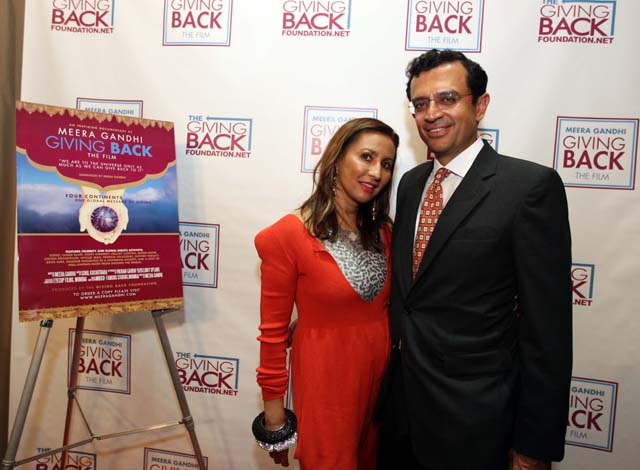
Kerry Kennedy, Cherie Blair, Bono, Steven Rockefeller, Vikram Gandhi, Clodagh and Peter Raj Singh on Giving….
‘Giving Back’ is Meera Gandhi’s cinematic tribute to all her friends in high places and the good that they do for others through organizations for women and children, addressing everything from human rights to micro-credit. Featured in the film are her interviews with Cherie Blair, Kerry Kennedy, U2’s singer Bono, Peter Raj Singh, interior designer Clodagh, Steven Rockefeller and others.
Featured organizations include Mother Teresa’s Asha Dan in Mumbai, ERVK (EleanorRoosevelt Center at Val-Kill), The Cherie Blair Foundation for women, The Robert F Kennedy foundation for Human Rights, Bono’s Red and One Campaign for Africa, United World College, Innocence in Danger, Grameen Bank and Hip Hop Summit for Youth which promotes gun control and education.
Guests nibbled on mini burgers and champagne at a packed reception at the Disney Screening Room on Park Avenue. Chris Meigher, publisher of the high society magazine Quest introduced the film to an audience of Manhattan’s elite crowd, and Meera’s husband, Vikram Gandhi, who is with Credit Suisse, gave the closing remarks. Everyone took home colorful goodie bags with the Giving Back DVD, which is available for sale, with all funds raised going to nonprofit organizations supported by the Giving Back Foundation.
Here Meera Gandhi, who has created the Giving Back Foundation, talks about the adventure of making the movie and ‘Giving Back’.
Why did you decide to make a movie about giving instead of just donating the money directly to the causes?
Every cause that I featured in my film has been supported by me and has either received money or I have raised money for them or I have co-chaired events for them.
The point of making the movie was really to stop and evaluate the giving back process. When I moved to Hong Kong and had a more objective view of things, I realized that so many people were actually doing amazing things, but there were also many people who were in a position too, who were not, simply because they were not sure how to.
I wanted my film to be a vehicle of inspiration to those who might want to do things for others, but were not really sure how to. The idea started when Cherie Blair came to Hong Kong last April and then a small project evolved into a film. But I always wanted to start a foundation because so many people who need come across my path and there is only so much one can do alone.
How was your husband Vikram Gandhi involved with the film?
Vikram encouraged me every step of the way, though true to who he is, he insisted I go to film school before we invested all this money in a film. So I took a course at the HK Academy for Filmmaking, before I embarked on the film. That actually proved to be quite useful later on in the process.
Vikram has been actively involved with Grameen, Muhammad Yunus’s bank for micro-credit for the last 8 years, and is on its global board. The bank gives unsecured loans to the poorest women in the world to enable them to start their own businesses. Vikram, who’s in my film, says, “Giving people actual tools to make a livelihood and build self-esteem for a lifetime – is what I love about the Grameen Loans!”
How long did the documentary take to make and where did you shoot it?
It took about 7 months to make, as I love seeing things completed successfully. It was not done full time, when I was in New York, I interviewed and filmed people, when in Hong Kong, did the same, when in India I filmed a little, and so on. It was done really “in between” whatever I was doing, and wherever I happened to be with the family.
But I will say that anyone I asked to be a part of this project said yes right away and it made the process efficient.
Also, Famous Studios, really Bollywood’s Universal studios, agreed to let me finish the film there and Sunil Kochuthara, the lead editor on this film was excellent. Libby Spears a noted documentary filmmaker flew in from LA, and we completed it in record time.
(All Photographs by Muhammed Jaffer/SnapsIndia)
Since this was your first effort, how difficult was it?
Let’s just say this is my first and last film. It’s not really for me. I wanted to get a message out and the giving back message is clear; I wanted to showcase my friends and people I admire for their work and was able to do so, though I really have so many more people that I would have been happy including, but its an expensive process and has no end, so I had to have a completion plan. But having said that I am doing a compilation DVD which will be sold with my book, which will have additional interviews and causes set to the music of Ronan Tynan.
It was difficult as I made many mistakes, I filmed all over the world and so had things on NTSC, or PAL, shot with many different types of cameras, and the film color was different in every part of the world – so a lot of energy was wasted in converting the various footage back to one system – and costly too!
Also, I did not know what ‘B Role’ was, so we had very little B role, and had to go over and over each clip to ‘extract B role.’ Also, I shot at parties and at my events in an attempt to be productive and tried to combine too much – as a result – many of the interviews had a lot of background noise, so we could not use them. I made many, many mistakes, but I have since learnt from them.
The good news is that, every thing you see in the film, we own, as we have shot it and so I have thousands of hours of rare footage with Bono, the Kennedys, people in the Hong Kong marketplace, lights at dusk in the Hong Kong markets, Indian streets.
Have you enjoyed the process of filming enough to attempt other kinds of films?
No, I do not think I will make more films. I want to now get out into the field and work and affect real change. After 22 years of raising my kids, they are all now away at schools and for the first time, I have real freedom to concentrate on my work.
As, I said earlier, there is a DVD that I want to make which will be again finished at Famous studios and will include worthy people that I could not include in the film for one reason or another. Also, Ronan Tynan’s music is inspiring and I would love to use that.
I am also working on building an ashram in India, the Giving Back Center in Delhi. It will be a place where I will build and run a girls school and spiritual center at the same time.
The foundation will hopefully attract more people to run it and I would like to be at the ashram for the next 20 to 25 years or as long as I live! I think that the desire to do good stems from a deep personal desire to share a spiritual longing of caring for other humans.
I have many ideas speeding through my brain, but I pick only one or two and then work on that. Completing things is very important to me.
What do you hope people will take away from your film?
I hope that people will see the film and feel uplifted. That they will see that there is so much goodness in the world in spite of gloom and doom. I want them to see that “Giving Back” is fun, and exciting and sexy, so much so that they want to run out and do something for others! I also hope they understand how I feel which is that ‘after all, we are to the universe only as much as we give back to it.’




